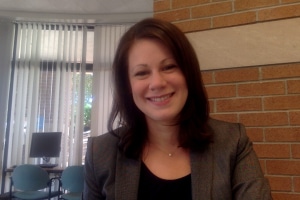Molly Rentscher is the latest alumna to be featured in the WRD Spotlight series. She graduated in 2015 with a Master’s in Writing, Rhetoric, & Discourse. Currently, Molly works as a writing center coordinator at Arizona State University.
What have you been doing professionally since you earned your degree?
I earned my degree in June of 2015, and shortly thereafter, I accepted a full-time position at Arizona State University (ASU) as a writing center coordinator. In my position, I am responsible for managing all aspects of operations for the West campus Writing Center and Graduate Writing Center; this includes hiring, supervising, and evaluating 12 student staff members and 1 professional staff member. I am the Arizona State Representative for the Rocky Mountain Writing Center Association, a regional chapter of the International Writing Center Association. I am also working on several projects related to linguistic diversity and multilingual writing in writing centers.
What is a typical day “on the job” for you?
One of the things I love most about my job is that each day is so different. A typical day may involve collaborating with faculty across disciplines to support students’ writing development, delivering a writing workshop for students, developing tutor training or leading an ongoing tutor education session, organizing and analyzing data, preparing a budget proposal, promoting writing center resources across campus, or tutoring students in our center.
How did your education from DePaul influence what you’re doing now?
Before completing a master’s degree, I knew I enjoyed writing, tutoring, and collaborating with others. Throughout my education at DePaul, I discovered that I loved teaching composition, and I developed a new interest in second language writing. My current job requires a lot of teaching, and my experiences in the Teaching Apprenticeship Program (TAP) helped prepare me to be a thoughtful and effective teacher. The courses I took while pursuing the Graduate Certificate in TESOL inspired me to conduct writing center research on multilingual students, and I am currently taking graduate courses at ASU to continue learning about multilingual composition. And of course, my graduate assistantship at DePaul’s University Center for Writing-based Learning (UCWbL) provided excellent training for being a writing center director. But perhaps most importantly, my education from DePaul helped me see the various ways that tutoring, teaching, and writing program administration overlap, and being able to see these intersections has influenced my work a lot, often in unexpected ways.
What were the most helpful courses you took in WRD?
It’s so hard to pick! WRD 540: Teaching Writing and WRD 551: Teaching Practicum were really important for foundational knowledge about teaching and learning, and these courses helped me refine my tutoring and teaching philosophies. I also learned how to think rhetorically about course materials, develop curriculum using best practices, collaborate with others to share resources and conduct grade-norming sessions, and use portfolios – skills I use in my current job. WRD 582: Writing Center Theory and Pedagogy, and my work in the UCWbL, helped me develop my philosophies about writing program administration, and taught me how to collaborate with others to identify and define core practices, values, and beliefs that help create a strong sense of community in any program or workplace.
What advice would you give to a WRD student who would one day like to work in a job like yours?
I would advise students to embark on as many academic and professional journeys as possible. And, I would advise students to talk often with their professors; the faculty in the WRD program are incredibly supportive and will do as much as they can to help you accomplish your goals. During my time in the MA in WRD program, I took a language acquisition course outside of the WRD Department, I taught second language writing in an intensive English program at Solex College and received course credit for that experience (WRD 591), and I became involved with DePaul’s Teaching Commons and presented at the Teaching and Learning Conference. I wouldn’t have been able to do these things without the support of the WRD faculty, and my education from DePaul was a lot richer because of these experiences.
